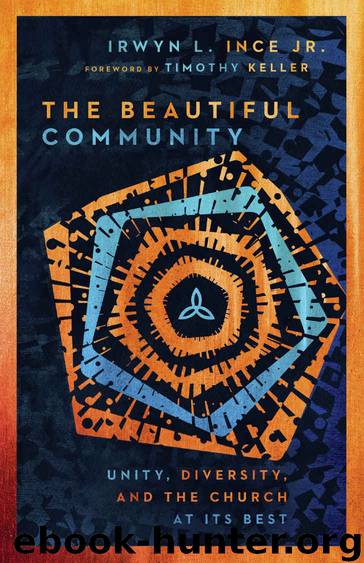The Beautiful Community by Ince Jr. Irwyn L

Author:Ince Jr., Irwyn L. [Ince Jr., Irwyn L.]
Language: eng
Format: epub
Publisher: InterVarsity Press
Published: 2020-08-03T16:00:00+00:00
Jerusalem’s large and diverse mix of peoples heard the disciples proclaiming the mighty works of God. They heard Peter preach the message of the gospel of Jesus Christ for the nations—for them. Peter makes sure to point out that “it shall come to pass that everyone who calls upon the name of the Lord shall be saved” (Acts 2:21). Then, after the people heard what Peter had to say, they were cut to the heart. They asked Peter and the apostles, “What shall we do?” Peter says, “Repent and be baptized every one of you in the name of Jesus Christ for the forgiveness of your sins, and you will receive the gift of the Holy Spirit. For the promise is for you and for your children and for all who are far off, everyone whom the Lord our God calls to himself” (Acts 2:38-39, emphasis added).
As “every nation under heaven” came to Jerusalem, the Lord God began calling people to himself. None of the nations would be excluded. There would be one Lord, one faith, one baptism, one God and Father of all. Peter’s audience that day needed to be exposed to what would become the new normal. Luke’s audience needed to hear that their new normal was the fulfillment of God’s promise. And we need to ask ourselves whether or not we’ve forsaken the new normal for something else.
The reason that the message was important for them and the question is important for us is because, while the new normal is wrought by the Spirit of God, it is extremely difficult to break out of our cultural comforts and pursue it wholeheartedly. Acts removes the veil to reveal this struggle in the church. The multinational audience in Acts 2 came together as people religiously committed to Judaism. They were either ethnically Jewish or converts to Judaism. In spite of their commonality, discrimination quickly reared its head in the early church.
In Acts 6, as the disciples were multiplying, a complaint arose from the Hellenists against the Hebrews (Acts 6:1). The complaint was that the Hellenist’s widows were being neglected in the daily distribution of resources for those in need. In this case, the dispute had to do with language. Some of the new disciples are native to Jerusalem and speak Aramaic as their primary language. These are the Hebrews, and they’re probably the majority. The others are from the Diaspora. They aren’t native to Jerusalem but came from other parts of the Roman empire. These people are the Hellenists and they spoke Greek. The struggle for the new normal of unity in diversity was very real.
This struggle continues in earnest in Acts 10:1-23 as the Holy Spirit makes it clear that the promise of Jesus’ kingdom is not limited to any ethnic, socioeconomic, political, or other type of group. Peter, who preached the powerful Pentecost sermon, is confronted with his own ethnic bias when the Lord calls him to preach the gospel to a Roman centurion named Cornelius. Cornelius
Download
This site does not store any files on its server. We only index and link to content provided by other sites. Please contact the content providers to delete copyright contents if any and email us, we'll remove relevant links or contents immediately.
Fearfully and Wonderfully Made by Philip Yancey & Paul Brand(589)
Christian Ethics by Wilkens Steve;(577)
Numbers by Ronald B. Allen(507)
The World from 1450 To 1700 by Wills John E.;(503)
Christian Ethics: An Introduction to Biblical Moral Reasoning by Wayne Grudem(484)
How to Read Slowly by James W. Sire(470)
God and the Multiverse by Victor J. Stenger(451)
Morality by Jonathan Sacks(437)
Monastic Archaeology by Unknown(409)
The Disabled Church by Rebecca F. Spurrier;(400)
Jesus: A New Vision by Whitley Strieber(378)
Critical Writings by Joyce James;(372)
Death of the Doctor by Unknown(371)
Redeeming Sociology by Vern S. Poythress(368)
Amish Grace by Donald B. Kraybill & Nolt Steven M. & Weaver-Zercher David L(367)
The Technological System by Jacques Ellul(358)
Children of Lucifer; The Origins of Modern Religious Satanism by Ruben van Luijk(357)
The Catholic Case for Trump by Austin Ruse(337)
The Church in the Early Middle Ages by G.R. Evans(337)
